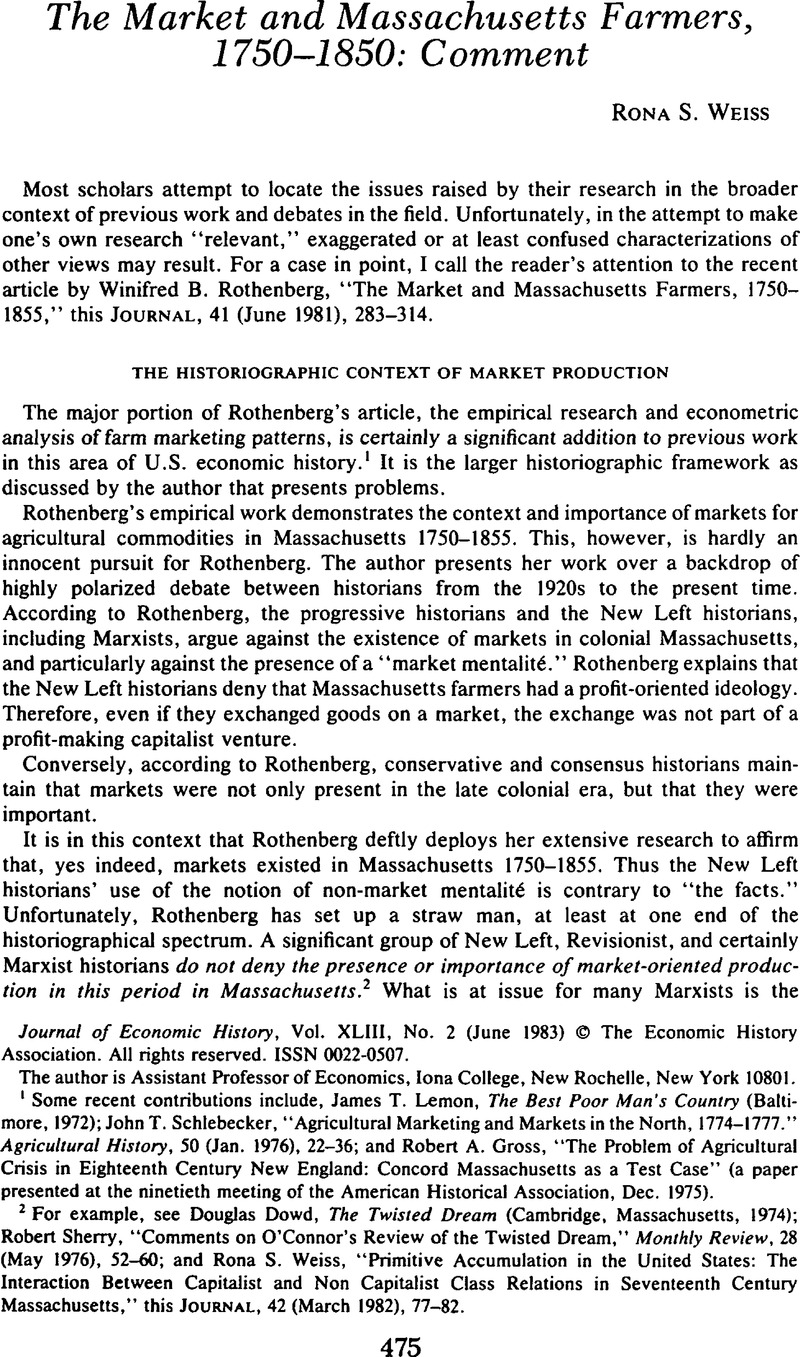Published online by Cambridge University Press: 03 March 2009

1 Some recent contributions include, James T. Lemon, The Best Poor Man's Country (Baltimore, 1972); John T. Schlebecker, “Agricultural Marketing and Markets in the North, 1774–1777.” Agricultural History, 50 (Jan. 1976), 22–36; and Robert A. Gross, “The Problem of Agricultural Crisis in Eighteenth Century New England: Concord Massachusetts as a Test Case” (a paper presented at the ninetieth meeting of the American Historical Association, Dec. 1975).
2 For example, see Dowd, Douglas, The Twisted Dream (Cambridge, Massachusetts, 1974);Google ScholarSherry, Robert, “Comments on O'Connor's Review of the Twisted Dream,” Monthly Review, 28 (05 1976), 52–60;CrossRefGoogle Scholar and Weiss, Rona S., “Primitive Accumulation in the United States: The Interaction Between Capitalist and Non Capitalist Class Relations in Seventeenth Century Massachusetts,” this JOURNAL, 42 (03 1982), 77–82.Google Scholar
3 See note #2 and Mayer, Margit and Fay, Margaret, “The Formation of the American Nation State,” Kapitalistate, 6 (Fall 1977), 39–90Google Scholar, Borrows, Edwin C., “The Transition Question in Early American History: A Check List of Recent Books, Articles and Dissertations,” Radical History Review, 18 (Fall 1978), 173–90.Google Scholar
4 For a more extensive explanation of this particular approach see Resnick, Stephen and Wolff, Richard, “The Theory of Transitional Conjunctures and the Transition from Feudalism to Capitalism in Western Europe,” The Review of Radical Political Economy, II (Fall 1979), 3–22Google Scholar, and “A Reformulation of Marxian Theory and Historical Analysis,” this JOURNAL, 42 (03 1982), 53–59.Google Scholar
5 For further explanation of the concept of ancient relations see Marx, Karl, Pre-Capitalist Economic Formations (New York, 1966);Google ScholarHindess, Barry and Hirst, Paul Q., Pre-Capitalist Modes of Production (London, 1975), pp. 79–108.Google Scholar
6 Szatmary, David, Shay's Rebellion: The Making of an Agrarian Insurrection (Amherst, 1980).Google Scholar
7 Gras, N. S. B., “What is Capitalism in the Light of History?” Business History Review, 21 (10 1947), 79–120CrossRefGoogle Scholar, and “Capitalism—Its Concepts and History,” Business History Review, 16 (04 1942), 21–34.CrossRefGoogle Scholar
8 Polanyi, Karl, The Great Transformation (Boston, 1965)Google Scholar, Mutch, Robert E., “Yeoman and Merchant in Pre-Industrial America: Eighteenth Century Massachusetts as a Case Study,” Societas, 7 (Autumn 1977), 279–302.Google Scholar
9 Rothenberg, , “The Market and Massachusetts Farmers 1750–1855,” pp. 313–14.Google Scholar
10 Szatmary, , Shay's RebellionGoogle Scholar, Oscar, and Handlin, Mary, Commonwealth (Cambridge, Massachusetts, 1969), pp. 12–15.Google ScholarNewcomer, Lee N., The Embattled Farmers (New York, 1953), pp. 10–12.Google Scholar
11 Weiss, Rona S., “The Development of the Market Economy in Colonial Massachusetts” (unpublished Ph.D dissertation, University of Massachusetts, 1981);Google ScholarJones, D. L., “The Strolling Poor: Transiency in 18th Century Massachusetts,” Journal of Social History, 3 (Spring 1975), 28–54.Google Scholar
12 Rutman, Darrett, Husbandmen of Plymouth (Boston, 1968), p. 14.Google Scholar